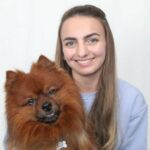Donate
About the research
BSAVA PetSavers-funded researchers at the University of Liverpool used qualitative methods to investigate owner expectations, experiences and attitudes to ageing in dogs. Pet owners were invited to submit diaries, photographs and videos, to share their experiences of living with an older dog. There were also opportunities for both veterinary professionals and pet owners to complete in-depth interviews and online questionnaires.
Findings and key themes from this part of the study were then used to develop online surveys to gather quantitative data from veterinary professionals and owners about their experiences of caring for senior dogs.
The results of the research showed that it can be difficult for owners to know what are ‘normal’ age-related changes (signs of ageing) or whether signs indicate possible disease that would benefit from veterinary advice and treatment.
Key findings from the study were used to develop an editable traffic light colour-coded checklist to help owners know whether to seek advice from a veterinary practice and to guide discussions during consultations. Regular discussions and veterinary check-ups can help relieve and prevent suffering, identify diseases earlier and ensure an ageing dog’s quality of life remains high and that they live longer. It is therefore recommended that senior dogs have health checks at least twice a year.

 Carri is a senior lecturer in human-animal interaction at the University of Liverpool with a passion for understanding the relationships we have with our pets. Her research interests focus on the implications of dog ownership for human health and wellbeing, but also how owner management of their dogs can impact dog welfare.
Carri is a senior lecturer in human-animal interaction at the University of Liverpool with a passion for understanding the relationships we have with our pets. Her research interests focus on the implications of dog ownership for human health and wellbeing, but also how owner management of their dogs can impact dog welfare. Lisa is a research associate at the University of Liverpool, and also provides freelance postdoctoral work for the Senior Family Dog Project at Eötvös Loránd University in Budapest. With a 20-year background in animal behaviour and conservation and more recently in cognition, health and welfare, she has spent time working with dogs, wolves, meerkats, and beavers in Europe, America, and Africa. Her current research interests include the influence of dog age on personality, cognition, healthspan and longevity, the human-dog relationship, and dog welfare and enrichment.
Lisa is a research associate at the University of Liverpool, and also provides freelance postdoctoral work for the Senior Family Dog Project at Eötvös Loránd University in Budapest. With a 20-year background in animal behaviour and conservation and more recently in cognition, health and welfare, she has spent time working with dogs, wolves, meerkats, and beavers in Europe, America, and Africa. Her current research interests include the influence of dog age on personality, cognition, healthspan and longevity, the human-dog relationship, and dog welfare and enrichment. Alan helped establish the Small Animal Veterinary Surveillance Network (SAVSNET) at the University of Liverpool with BSAVA support. SAVSNET collects large volumes of health data from across the UK, using it to gain new insights into the many varied reasons pets attend veterinary practices and how they are managed. Alan was brought up with pets and caring for them through their old age was both wonderful and sad. He was excited that this project focused on the older animals seen in veterinary practices, to learn about the problems faced by their senior patients from our practices participating in the study, and to turn that into practical advice for owners of ageing animals and those caring for them. SAVSNET also shared the process of the research along the way.
Alan helped establish the Small Animal Veterinary Surveillance Network (SAVSNET) at the University of Liverpool with BSAVA support. SAVSNET collects large volumes of health data from across the UK, using it to gain new insights into the many varied reasons pets attend veterinary practices and how they are managed. Alan was brought up with pets and caring for them through their old age was both wonderful and sad. He was excited that this project focused on the older animals seen in veterinary practices, to learn about the problems faced by their senior patients from our practices participating in the study, and to turn that into practical advice for owners of ageing animals and those caring for them. SAVSNET also shared the process of the research along the way. Alex is probably best known for his work on companion animal obesity, however, he also established The Feline Healthy Ageing Clinic in 2017, to support a long-term prospective study into how cats age. This clinic, supported by Royal Canin, monitors the health of cats from 7-10 years onwards, with over 200 cats enrolled to date. Cats visit the clinic every 6 months, and a wealth of clinical information is recorded. The insights that Alex has gained from this project was invaluable for the PetSavers citizen science project, particularly informing in the design and piloting of the PetSavers canine ageing and welfare tool.
Alex is probably best known for his work on companion animal obesity, however, he also established The Feline Healthy Ageing Clinic in 2017, to support a long-term prospective study into how cats age. This clinic, supported by Royal Canin, monitors the health of cats from 7-10 years onwards, with over 200 cats enrolled to date. Cats visit the clinic every 6 months, and a wealth of clinical information is recorded. The insights that Alex has gained from this project was invaluable for the PetSavers citizen science project, particularly informing in the design and piloting of the PetSavers canine ageing and welfare tool. Enikő is a senior research fellow at the Department of Ethology, Eötvös Loránd University, the principal investigator of their Senior Family Dog Project, and the founder of the donation-based Dog Brain and Tissue Bank in Budapest. She holds a PhD in ethology, and degrees in biology, video communication, and biology teaching. She is the author of 70 scientific papers about canine ageing, social learning, dogs’ and wolves’ comparative cognition, personality, and behavioural genetics. Her role in the project as a consultant was to help finalise the online questionnaires for owners and veterinary staff.
Enikő is a senior research fellow at the Department of Ethology, Eötvös Loránd University, the principal investigator of their Senior Family Dog Project, and the founder of the donation-based Dog Brain and Tissue Bank in Budapest. She holds a PhD in ethology, and degrees in biology, video communication, and biology teaching. She is the author of 70 scientific papers about canine ageing, social learning, dogs’ and wolves’ comparative cognition, personality, and behavioural genetics. Her role in the project as a consultant was to help finalise the online questionnaires for owners and veterinary staff. Zoe graduated from Cambridge University as a veterinary surgeon in 2003 and became a European Recognised Specialist in small animal internal medicine in 2011. Informed by her own experience of caring for an elderly osteoarthritic terrier, her PhD at the Centre for Evidence-based Veterinary Medicine, University of Nottingham explored how vets and owners make decisions about dogs with osteoarthritis.
Zoe graduated from Cambridge University as a veterinary surgeon in 2003 and became a European Recognised Specialist in small animal internal medicine in 2011. Informed by her own experience of caring for an elderly osteoarthritic terrier, her PhD at the Centre for Evidence-based Veterinary Medicine, University of Nottingham explored how vets and owners make decisions about dogs with osteoarthritis. Jodie was the MPhil student working on the BSAVA PetSavers’ Old Age Pets Project at the University of Liverpool. When the project began, she had recently graduated from the University of Nottingham, having studied Animal Science with a Year in Industry BSc (Hons). She knew throughout her studies and year in industry that she wanted to contribute to research that improves the welfare of companion animals, and so working on this project to improve senior dog health and their wellbeing was a great opportunity. Jodie’s dog is Entei, an 8-year-old Pomeranian who loves a photo opportunity, and lots of cuddles too.
Jodie was the MPhil student working on the BSAVA PetSavers’ Old Age Pets Project at the University of Liverpool. When the project began, she had recently graduated from the University of Nottingham, having studied Animal Science with a Year in Industry BSc (Hons). She knew throughout her studies and year in industry that she wanted to contribute to research that improves the welfare of companion animals, and so working on this project to improve senior dog health and their wellbeing was a great opportunity. Jodie’s dog is Entei, an 8-year-old Pomeranian who loves a photo opportunity, and lots of cuddles too.